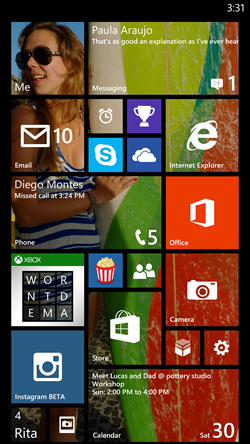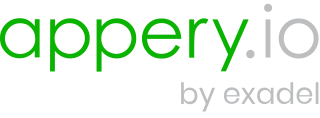
Adobe Flash is a multimedia software platform used for production of animations, rich web applications, desktop applications, mobile apps, mobile games, and embedded web browser video players. Flash displays text, vector graphics, and raster graphics to provide animations, video games, and applications. It allows streaming of audio and video, and can capture mouse, keyboard, microphone, and camera input.

Microsoft Outlook is a personal information manager software system from Microsoft, available as a part of the Microsoft Office and Microsoft 365 software suites. Though primarily an email client, Outlook also includes such functions as calendaring, task managing, contact managing, note-taking, journal logging and web browsing. And has also become a popular email client for many businesses.
Mobile app development is the act or process by which a mobile app is developed for mobile devices, such as personal digital assistants, enterprise digital assistants or mobile phones. These software applications are designed to run on mobile devices, such as a smartphone or tablet computer. These applications can be pre-installed on phones during manufacturing platforms, or delivered as web applications using server-side or client-side processing to provide an "application-like" experience within a web browser. Application software developers also must consider a long array of screen sizes, hardware specifications, and configurations because of intense competition in mobile software and changes within each of the platforms. Mobile app development has been steadily growing, in revenues and jobs created. A 2013 analyst report estimates there are 529,000 direct app economy jobs within the EU then 28 members, 60 percent of which are mobile app developers.

Adobe AIR is a cross-platform runtime system currently developed by Harman International, in collaboration with Adobe Inc., for building desktop applications and mobile applications, programmed using Adobe Animate, ActionScript, and optionally Apache Flex. It was originally released in 2008. The runtime supports installable applications on Windows, macOS, and mobile operating systems, including Android, iOS, and BlackBerry Tablet OS.

eBuddy is a privately held Dutch software company that offers instant messaging services. As of 2011, eBuddy reported 100 million downloads. The company's flagship service is XMS, a proprietary cross-platform instant messaging service. After some changes of ownership, the company is now again owned by its original founders, Onno Bakker and Jan-Joost Rueb.

Android is a mobile operating system based on a modified version of the Linux kernel and other open-source software, designed primarily for touchscreen mobile devices such as smartphones and tablets. Android is developed by a consortium of developers known as the Open Handset Alliance and commercially sponsored by Google. It was unveiled in November 2007, with the first commercial Android device, the HTC Dream, being launched in September 2008.

Windows Phone (WP) is a discontinued family of mobile operating systems developed by Microsoft for smartphones as the replacement successor to Windows Mobile and Zune. Windows Phone featured a new user interface derived from the Metro design language. Unlike Windows Mobile, it was primarily aimed at the consumer market rather than the enterprise market.
The Android Package with the file extension apk is the file format used by the Android operating system, and a number of other Android-based operating systems for distribution and installation of mobile apps, mobile games and middleware. It can be written in either Java or Kotlin.

Apache Cordova is a mobile application development framework created by Nitobi. Adobe Systems purchased Nitobi in 2011, rebranded it as PhoneGap, and later released an open-source version of the software called Apache Cordova. Apache Cordova enables software programmers to build hybrid web applications for mobile devices using CSS3, HTML5, and JavaScript, instead of relying on platform-specific APIs like those in Android, iOS, or Windows Phone. It enables wrapping up of CSS, HTML, and JavaScript code depending upon the platform of the device. It extends the features of HTML and JavaScript to work with the device. The resulting applications are hybrid, meaning that they are neither truly native mobile application nor purely Web-based. They are not native because all layout rendering is done via Web views instead of the platform's native UI framework. They are not Web apps because they are packaged as apps for distribution and have access to native device APIs. Mixing native and hybrid code snippets has been possible since version 1.9.
Titanium SDK is an open-source framework that allows the creation of native mobile applications on platforms including iOS, Android and Windows UWP from a single JavaScript codebase, developed by Appcelerator.

Sencha Touch is a user interface (UI) JavaScript library, or web framework, specifically built for the Mobile Web. It can be used by Web developers to develop user interfaces for mobile web applications that look and feel like native applications on supported mobile devices. It is based on web standards such as HTML5, CSS3 and JavaScript. The goal of Sencha Touch is to facilitate quick and easy development of HTML5 based mobile apps which run on Android, iOS, Windows, Tizen and BlackBerry devices, simultaneously allowing a native look and feel to the apps.

Xamarin is a Microsoft-owned San Francisco-based software company founded in May 2011 by the engineers that created Mono, Xamarin.Android and Xamarin.iOS, which are cross-platform implementations of the Common Language Infrastructure (CLI) and Common Language Specifications.

Firefox OS is a discontinued open-source operating system – made for smartphones, tablet computers, smart TVs, and dongles designed by Mozilla and external contributors. It is based on the rendering engine of the Firefox web browser, Gecko, and on the Linux kernel. It was first commercially released in 2014.
A mobile application or app is a computer program or software application designed to run on a mobile device such as a phone, tablet, or watch. Mobile applications often stand in contrast to desktop applications which are designed to run on desktop computers, and web applications which run in mobile web browsers rather than directly on the mobile device.
Fluid UI is a browser-based wireframing and prototyping tool developed by Fluid Software and used to design mobile touch interfaces.

Mozilla is a free software community founded in 1998 by members of Netscape. The Mozilla community uses, develops, spreads and supports Mozilla products, thereby promoting exclusively free software and open standards, with only minor exceptions. The community is supported institutionally by the non-profit Mozilla Foundation and its tax-paying subsidiary, the Mozilla Corporation.
Microsoft mobile services are a set of proprietary mobile services created specifically for mobile devices, they are typically offered through mobile applications and mobile browser for Windows Phone, | platforms, BREW, and Java. Microsoft's mobile services are typically connected with a Microsoft account and often come preinstalled on Microsoft's own mobile operating systems while they are offered via various means for other platforms. Microsoft started to develop for mobile computing platforms with the launch of Windows CE in 1996 and later added Microsoft's Pocket Office suite to their Handheld PC line of PDAs in April 2000. From December 2014 to June 2015, Microsoft made a number of corporate acquisitions, buying several of the top applications listed in Google Play and the App Store including Acompli, Sunrise Calendar, Datazen, Wunderlist, Echo Notification Lockscreen, and MileIQ.
Adobe Edge is a suite of web development tools developed by Adobe that enhances the capabilities of their other applications, such as Dreamweaver. The first application in the suite was released in August 2011 as a multimedia authoring tool designed to succeed the Flash platform. In September 2012, Adobe renamed the application Edge Animate, and announced Edge Reflow, Edge Code, and Edge Inspect. Also packaged with the suite are Edge Web Fonts, the PhoneGap application, and access to Adobe's Typekit service.

Appery.io is a cloud-based HTML5, Ionic, jQuery Mobile, and hybrid app-building platform for developing mobile apps, web apps, and PWA s. Appery.io is a browser-based drag-and-drop visual builder tool that supports Android and iOS with integrated Apache Cordova/PhoneGap output.. The platform is used by DIYers to create apps for their customers.











